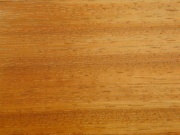Difference between revisions of "Iroko"
Jump to navigation
Jump to search
(username removed) |
(username removed) |
||
| Line 6: | Line 6: | ||
== Synonyms and Related Terms == | == Synonyms and Related Terms == | ||
| − | ''Chlorophor excelsa''; mvule; African teak; iroko (Fr.); | + | ''Chlorophor excelsa''; mvule; African teak; iroko (Fr.); câmbala (Port.) |
{| class="wikitable" | {| class="wikitable" | ||
| Line 22: | Line 22: | ||
== Authority == | == Authority == | ||
| − | * | + | * F. H. Titmuss, ''Commercial Timbers of the World'', The Technical Press Ltd., London, 1965 Comment: 41 ppcf |
| − | * | + | * Michael McCann, ''Artist Beware'', Watson-Guptill Publications, New York City, 1979 |
* ''CRC Handbook of Chemistry and Physics'', Robert Weast (ed.), CRC Press, Boca Raton, Florida, v. 61, 1980 Comment: density=61 ppcf (0.98 g/cm3) | * ''CRC Handbook of Chemistry and Physics'', Robert Weast (ed.), CRC Press, Boca Raton, Florida, v. 61, 1980 Comment: density=61 ppcf (0.98 g/cm3) | ||
Revision as of 06:44, 24 July 2013
Description
A wood produced from the Chlorophor excelsa tree native to Africa. Iroko is a medium weight wood with an open-grain texture. The color is a brown with yellow streaks. Iroko has been used for structures, ship building, cabinets, and furniture.
Synonyms and Related Terms
Chlorophor excelsa; mvule; African teak; iroko (Fr.); câmbala (Port.)
| Density | 41 ppcf |
|---|
Hazards and Safety
Susceptible to wood borers.
Skin contact may cause irritation.
Authority
- F. H. Titmuss, Commercial Timbers of the World, The Technical Press Ltd., London, 1965 Comment: 41 ppcf
- Michael McCann, Artist Beware, Watson-Guptill Publications, New York City, 1979
- CRC Handbook of Chemistry and Physics, Robert Weast (ed.), CRC Press, Boca Raton, Florida, v. 61, 1980 Comment: density=61 ppcf (0.98 g/cm3)
